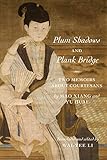Plum Shadows and Plank Bridge : Two Memoirs About Courtesans / Huai Yu, Xiang Mao.
Material type: TextSeries: Translations from the Asian ClassicsPublisher: New York, NY : Columbia University Press, [2020]Copyright date: ©2019Description: 1 online resourceContent type:
TextSeries: Translations from the Asian ClassicsPublisher: New York, NY : Columbia University Press, [2020]Copyright date: ©2019Description: 1 online resourceContent type: - 9780231186841
- 9780231546867
- 306.740951/09032 23
- HQ250.A5 P58 2020
- HQ250.A5
- online - DeGruyter
| Item type | Current library | Call number | URL | Status | Notes | Barcode | |
|---|---|---|---|---|---|---|---|
 eBook
eBook
|
Biblioteca "Angelicum" Pont. Univ. S.Tommaso d'Aquino Nuvola online | online - DeGruyter (Browse shelf(Opens below)) | Online access | Not for loan (Accesso limitato) | Accesso per gli utenti autorizzati / Access for authorized users | (dgr)9780231546867 |
Frontmatter -- Contents -- Acknowledgments -- Abbreviations -- Introduction -- Reminiscences of the Plum Shadows Convent -- Miscellaneous Records of the Plank Bridge -- Two Famous Courtesans -- Notes -- Works Cited -- Index of Names
restricted access online access with authorization star
http://purl.org/coar/access_right/c_16ec
Amid the turmoil of the Ming-Qing dynastic transition in seventeenth-century China, some intellectuals sought refuge in romantic memories from what they perceived as cataclysmic events. This volume presents two memoirs by famous men of letters, Reminiscences of the Plum Shadows Convent by Mao Xiang (1611–93) and Miscellaneous Records of Plank Bridge by Yu Huai (1616–96), that recall times spent with courtesans. They evoke the courtesan world in the final decades of the Ming dynasty and the aftermath of its collapse.Mao Xiang chronicles his relationship with the courtesan Dong Bai, who became his concubine two years before the Ming dynasty fell. His mournful remembrance of their life together, written shortly after her early death, includes harrowing descriptions of their wartime sufferings as well as idyllic depictions of romantic bliss. Yu Huai offers a group portrait of Nanjing courtesans, mixing personal memories with reported anecdotes. Writing fifty years after the fall of the Ming, he expresses a deep nostalgia for courtesan culture that bears the toll of individual loss and national calamity. Together, they shed light on the sensibilities of late Ming intellectuals: their recollections of refined pleasures and ruminations on the vagaries of memory coexist with political engagement and a belief in bearing witness. With an introduction and extensive annotations, Plum Shadows and Plank Bridge is a valuable source for the literature of remembrance, the representation of women, and the social role of intellectuals during a tumultuous period in Chinese history.
Mode of access: Internet via World Wide Web.
In English.
Description based on online resource; title from PDF title page (publisher's Web site, viewed 25. Jun 2024)


